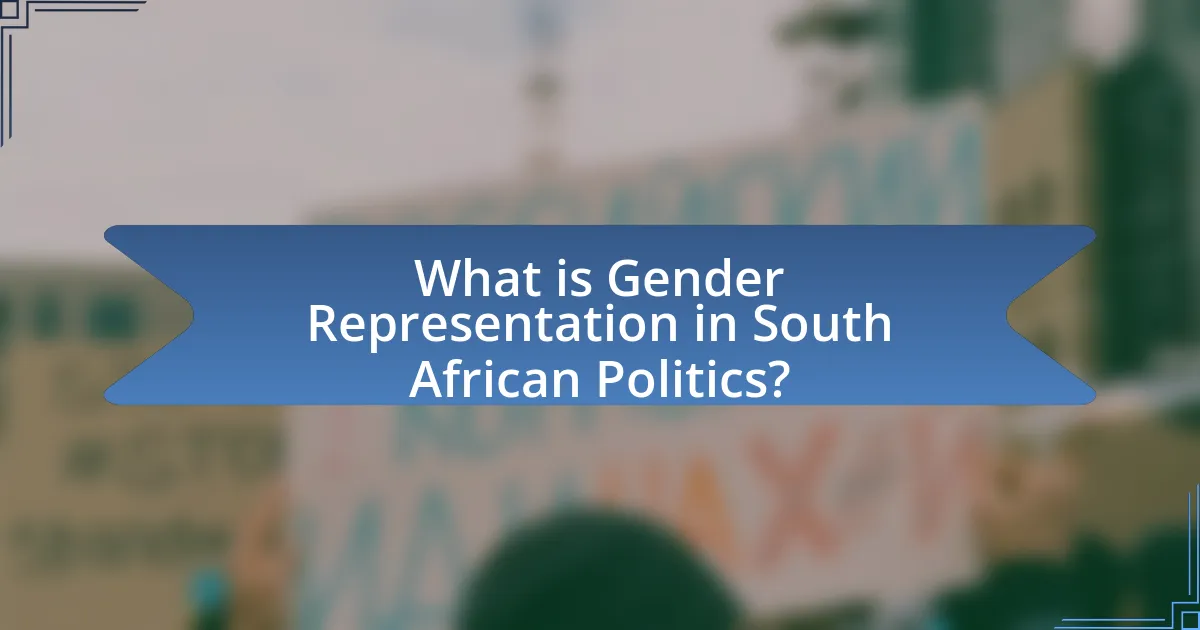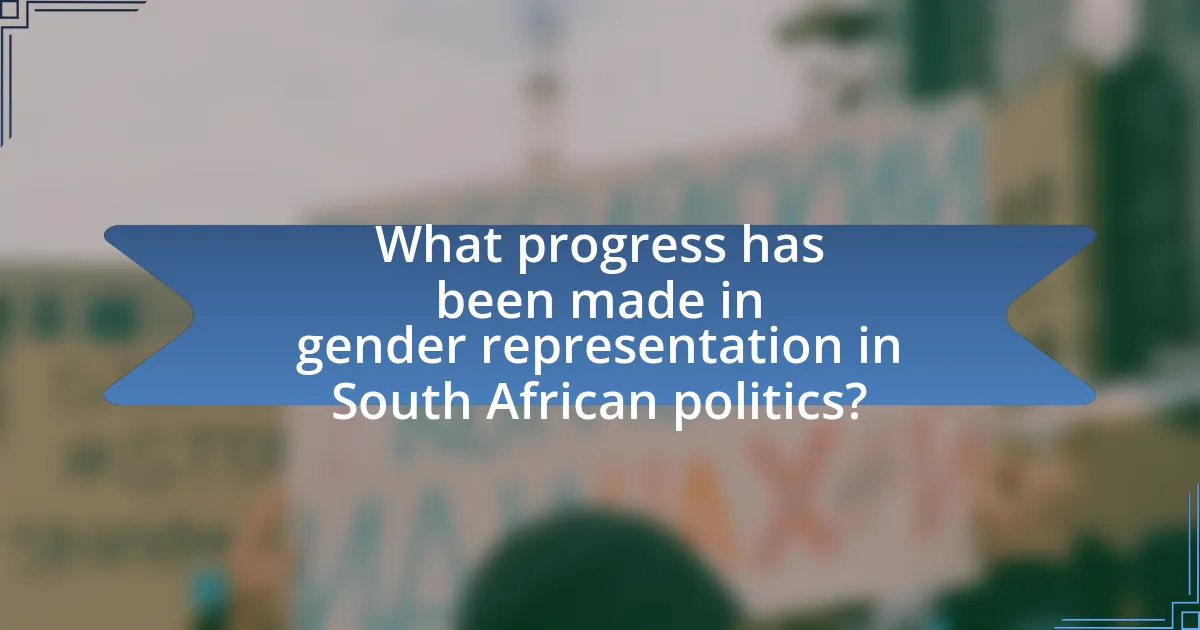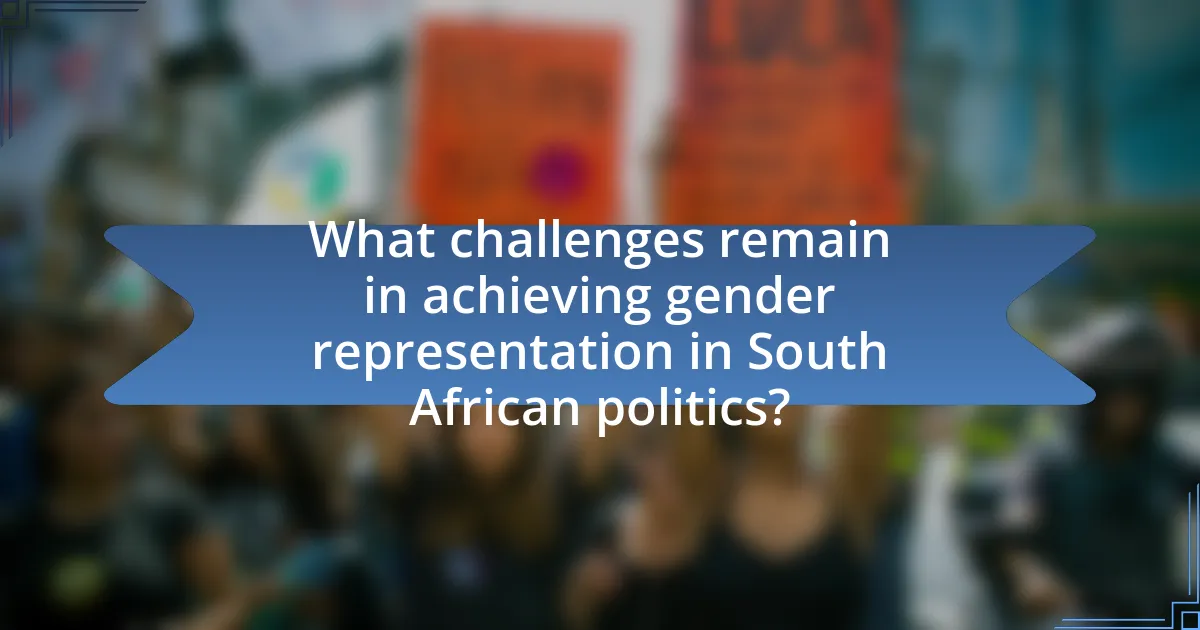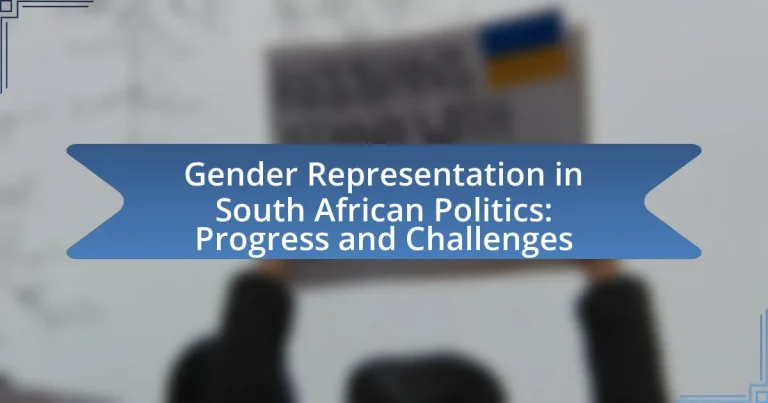Gender representation in South African politics refers to the inclusion of individuals of different genders, particularly women, in political decision-making and leadership roles. As of 2023, women occupy approximately 46% of seats in the National Assembly, positioning South Africa as a leader in female political representation in Africa. The article examines the importance of gender representation, its historical context influenced by apartheid, current statistics, and the impact on policy-making. It also addresses the challenges women face in politics, including cultural norms and systemic barriers, while highlighting successful legislative measures and grassroots movements that have contributed to progress in gender equality.

What is Gender Representation in South African Politics?
Gender representation in South African politics refers to the inclusion and participation of individuals of different genders, particularly women, in political decision-making processes and leadership roles. As of 2023, women hold approximately 46% of seats in the National Assembly, making South Africa one of the leading countries in Africa for female political representation. This progress is supported by legislative frameworks such as the Constitution of South Africa and the Gender Equality Bill, which promote gender parity in political structures. Despite these advancements, challenges remain, including societal norms and political party dynamics that can hinder women’s full participation in politics.
Why is gender representation important in politics?
Gender representation is important in politics because it ensures that diverse perspectives and experiences are included in decision-making processes. When women and marginalized genders participate in politics, policies are more likely to address the needs of the entire population, leading to more equitable outcomes. Research shows that countries with higher levels of gender representation in legislative bodies tend to have better social and economic indicators, such as improved health care and education systems. For instance, a study by the Inter-Parliamentary Union found that nations with at least 30% women in parliament are more likely to pass legislation that benefits women and children. This highlights the critical role gender representation plays in fostering inclusive governance and promoting social justice.
What historical context influences gender representation in South Africa?
The historical context influencing gender representation in South Africa is primarily shaped by the legacy of apartheid, which enforced systemic racial and gender inequalities. Under apartheid, women, particularly black women, faced significant socio-economic disadvantages and were largely excluded from political participation. The post-apartheid era, marked by the 1994 democratic transition, introduced policies aimed at promoting gender equality, such as the Constitution’s commitment to non-discrimination and the establishment of gender quotas in political parties. These changes have led to increased female representation in government, with women holding 46% of parliamentary seats as of 2021, reflecting a significant shift from the past. However, challenges remain, including cultural norms and economic disparities that continue to affect women’s political engagement and representation.
How does gender representation impact policy-making?
Gender representation significantly impacts policy-making by ensuring diverse perspectives are included in the decision-making process. When women are represented in political positions, policies tend to address issues such as healthcare, education, and gender equality more effectively. Research indicates that countries with higher female representation in government, such as Rwanda, which has the highest percentage of women in parliament globally at over 60%, often implement more progressive social policies. This correlation suggests that gender diversity in leadership roles leads to more comprehensive and inclusive policy outcomes, ultimately benefiting society as a whole.
What are the current statistics on gender representation in South African politics?
As of 2023, women hold 46% of the seats in the National Assembly of South Africa, reflecting significant progress in gender representation. This statistic indicates that South Africa ranks among the top countries globally for female parliamentary representation. Additionally, women occupy 30% of ministerial positions in the cabinet, showcasing advancements in leadership roles. These figures are supported by data from the Inter-Parliamentary Union, which highlights South Africa’s commitment to gender equality in politics.
How do these statistics compare to global standards?
South Africa’s gender representation statistics in politics show significant progress compared to global standards, with women holding approximately 46% of parliamentary seats as of 2023. This figure exceeds the global average of around 26% for women in national parliaments, indicating that South Africa is a leader in gender representation on the African continent and ranks favorably in the global context. The Inter-Parliamentary Union reported that only 25 countries have achieved or surpassed gender parity in their legislative bodies, highlighting South Africa’s notable achievement in this area.
What trends have emerged in recent elections regarding gender representation?
Recent elections in South Africa have shown a significant increase in gender representation, particularly with more women being elected to various levels of government. In the 2019 national elections, women constituted 46% of the African National Congress (ANC) candidates, reflecting a commitment to gender parity. Additionally, the overall representation of women in the National Assembly rose to 50%, marking a historic milestone. This trend is supported by the implementation of gender quotas and advocacy from civil society organizations, which have pushed for greater female participation in politics.

What progress has been made in gender representation in South African politics?
Significant progress has been made in gender representation in South African politics, particularly since the end of apartheid in 1994. The South African government has implemented policies aimed at increasing women’s participation in political structures, resulting in women holding 46% of seats in the National Assembly as of 2021, which is one of the highest percentages globally. Additionally, the African National Congress (ANC) has a gender quota system that mandates at least 50% representation of women in its leadership positions. This commitment to gender parity is further supported by the Constitution of South Africa, which promotes equality and prohibits discrimination based on gender.
What legislative measures have been implemented to promote gender equality?
Legislative measures implemented to promote gender equality in South Africa include the Promotion of Equality and Prevention of Unfair Discrimination Act of 2000, which aims to eliminate discrimination and promote equality. Additionally, the Employment Equity Act of 1998 mandates equal opportunities in the workplace and requires employers to implement affirmative action measures to ensure equitable representation of women. The South African Constitution, adopted in 1996, also enshrines the right to equality and prohibits discrimination based on gender. These laws collectively support gender equality by establishing legal frameworks that protect women’s rights and promote their participation in various sectors.
How effective have these measures been in increasing female political participation?
The measures implemented to increase female political participation in South Africa have been moderately effective. For instance, the introduction of gender quotas has led to a significant rise in women’s representation in political positions, with women holding 46% of seats in the National Assembly as of 2021, compared to just 27% in 1994. Additionally, the Women’s Empowerment and Gender Equality Bill aims to further enhance women’s roles in decision-making processes. However, challenges remain, such as societal attitudes and structural barriers that continue to hinder full participation.
What role do political parties play in promoting gender representation?
Political parties play a crucial role in promoting gender representation by establishing policies and frameworks that encourage the inclusion of women in political positions. In South Africa, political parties implement gender quotas and affirmative action strategies to ensure that women are adequately represented in their ranks. For instance, the African National Congress (ANC) has a policy that mandates a minimum of 50% representation of women in its leadership structures, which has significantly increased female representation in government. According to the Inter-Parliamentary Union, as of 2021, South Africa ranked 10th globally for women in national parliament, largely due to the efforts of political parties to prioritize gender equality.
What successes can be highlighted in the journey towards gender equality in politics?
Significant successes in the journey towards gender equality in politics include the implementation of gender quotas and the increased representation of women in leadership roles. In South Africa, the adoption of the 50% gender representation target in the African National Congress (ANC) has led to women holding 46% of parliamentary seats as of 2021, a notable increase from 27% in 1994. Additionally, the establishment of the Women’s Empowerment and Gender Equality Bill has further promoted women’s participation in decision-making processes. These measures demonstrate a commitment to enhancing gender equality in political representation, contributing to a more balanced and inclusive political landscape.
Which female leaders have made significant contributions to South African politics?
Significant female leaders in South African politics include Winnie Madikizela-Mandela, who was a prominent anti-apartheid activist and served as a Member of Parliament, and Nkosazana Dlamini-Zuma, who has held various ministerial positions and was the first female chairperson of the African Union. Madikizela-Mandela’s activism and political career were pivotal in the struggle against apartheid, while Dlamini-Zuma’s leadership roles have influenced both national and continental policies. Their contributions have shaped the political landscape and advanced gender representation in South Africa.
How have grassroots movements influenced gender representation?
Grassroots movements have significantly influenced gender representation by mobilizing communities to advocate for women’s rights and political participation. For instance, organizations like the Women’s League of the African National Congress have played a crucial role in pushing for gender quotas and policies that promote women’s representation in political offices. Research indicates that after the establishment of such movements, South Africa saw an increase in women’s representation in parliament from 27% in 1994 to over 46% in 2021, demonstrating the tangible impact of grassroots activism on political structures.

What challenges remain in achieving gender representation in South African politics?
Challenges in achieving gender representation in South African politics include systemic barriers, cultural norms, and political party dynamics. Systemic barriers manifest in the form of limited access to resources and networks for women, which hinders their ability to compete effectively in elections. Cultural norms often perpetuate stereotypes that undermine women’s leadership capabilities, leading to societal resistance against female politicians. Additionally, political party dynamics can marginalize women by prioritizing male candidates, as evidenced by the underrepresentation of women in key decision-making positions; for instance, women held only 46% of parliamentary seats as of 2021, despite policies aimed at promoting gender equality. These factors collectively impede progress toward equitable gender representation in South African politics.
What barriers do women face in entering politics?
Women face several barriers in entering politics, including systemic discrimination, cultural norms, and lack of access to resources. Systemic discrimination manifests in political structures that favor male candidates, often resulting in fewer opportunities for women to be nominated or elected. Cultural norms in South Africa can discourage women from pursuing political careers, as traditional gender roles often prioritize domestic responsibilities over public service. Additionally, women frequently encounter challenges in accessing financial resources and networks necessary for campaigning, which are often dominated by men. According to the Inter-Parliamentary Union, as of 2021, women held only 46% of parliamentary seats in South Africa, highlighting the ongoing challenges they face in achieving equal representation.
How do cultural attitudes impact women’s political participation?
Cultural attitudes significantly impact women’s political participation by shaping societal norms and expectations regarding gender roles. In South Africa, traditional beliefs often prioritize male leadership, which can discourage women’s involvement in politics. For instance, a study by the Human Sciences Research Council found that 60% of South Africans believe men are better suited for political leadership than women, reflecting a pervasive bias that undermines women’s political aspirations. Additionally, cultural perceptions of women’s roles as caregivers can limit their time and resources for political engagement, further exacerbating gender disparities in political representation.
What role does violence and intimidation play in deterring women from politics?
Violence and intimidation significantly deter women from participating in politics by creating an environment of fear and insecurity. This hostile atmosphere discourages women from seeking political office or engaging in political activities, as evidenced by reports indicating that women candidates often face threats of physical harm, harassment, and social ostracism. For instance, a study by the Electoral Institute for Sustainable Democracy in Africa found that 40% of women politicians in South Africa reported experiencing violence or intimidation during their political careers. Such experiences not only undermine women’s confidence but also perpetuate gender inequality in political representation, limiting the diversity of voices in decision-making processes.
What are the implications of underrepresentation of women in political decision-making?
The underrepresentation of women in political decision-making leads to a lack of diverse perspectives and interests in governance, which can result in policies that do not adequately address the needs of the entire population. This imbalance can perpetuate gender inequality, as women’s issues may be overlooked or inadequately addressed in legislative processes. For instance, research from the Inter-Parliamentary Union indicates that countries with higher percentages of women in parliament tend to have more progressive policies on health, education, and social welfare, demonstrating the positive impact of gender representation on policy outcomes. Furthermore, the absence of women in leadership roles can discourage future generations of women from pursuing political careers, thereby reinforcing a cycle of underrepresentation.
How does the lack of gender diversity affect governance and policy outcomes?
The lack of gender diversity negatively impacts governance and policy outcomes by limiting the perspectives and experiences that inform decision-making processes. Research indicates that organizations and governments with greater gender diversity are more likely to produce policies that address the needs of a broader population, leading to more equitable and effective governance. For instance, a study by the World Economic Forum found that countries with higher female representation in political leadership tend to have better social policies, including those related to health and education. This correlation suggests that the absence of women in governance can result in policies that overlook critical issues affecting half of the population, ultimately hindering social progress and economic development.
What strategies can be employed to overcome these challenges?
To overcome challenges in gender representation in South African politics, implementing targeted policies such as gender quotas can significantly enhance women’s participation. Gender quotas have been shown to increase the number of women in political positions, as evidenced by countries like Rwanda, which has the highest percentage of women in parliament globally, at 61%. Additionally, fostering mentorship programs for women in politics can provide essential support and guidance, helping to build a pipeline of female leaders. Research indicates that mentorship increases women’s confidence and political efficacy, which are crucial for their success in political roles. Furthermore, raising public awareness about gender equality through educational campaigns can shift societal attitudes and encourage more equitable representation. These strategies collectively address systemic barriers and promote a more inclusive political landscape.
What best practices can be adopted to enhance gender representation in South African politics?
To enhance gender representation in South African politics, implementing gender quotas is a best practice that has proven effective. Gender quotas can ensure that a certain percentage of political candidates or elected officials are women, thereby increasing their representation in decision-making processes. For instance, countries like Rwanda have successfully utilized quotas, resulting in women holding over 60% of parliamentary seats, which South Africa can emulate to improve its current representation, where women occupy approximately 46% of parliamentary positions. Additionally, providing training and mentorship programs for women in politics can empower them to pursue leadership roles, as evidenced by initiatives like the Women in Politics program, which has shown positive outcomes in increasing female political participation.
How can mentorship programs support aspiring female politicians?
Mentorship programs can support aspiring female politicians by providing guidance, networking opportunities, and skill development tailored to the unique challenges they face in the political landscape. These programs connect emerging female leaders with experienced mentors who can share insights on navigating political structures, campaign strategies, and public speaking. Research indicates that women in mentorship roles are more likely to pursue political office; for instance, a study by the Center for American Women and Politics found that women with mentors are significantly more likely to run for office than those without. This evidence underscores the effectiveness of mentorship in fostering female political participation and leadership.
What role can education play in promoting gender equality in politics?
Education plays a crucial role in promoting gender equality in politics by equipping individuals with the knowledge and skills necessary to engage in political processes. It fosters critical thinking, awareness of rights, and understanding of governance, which empowers women to participate actively in political discourse and decision-making. Research indicates that higher levels of education correlate with increased political participation among women; for instance, a study by the World Bank found that educated women are more likely to vote and run for office. Furthermore, educational programs that focus on gender issues can challenge stereotypes and societal norms, creating a more inclusive political environment.


